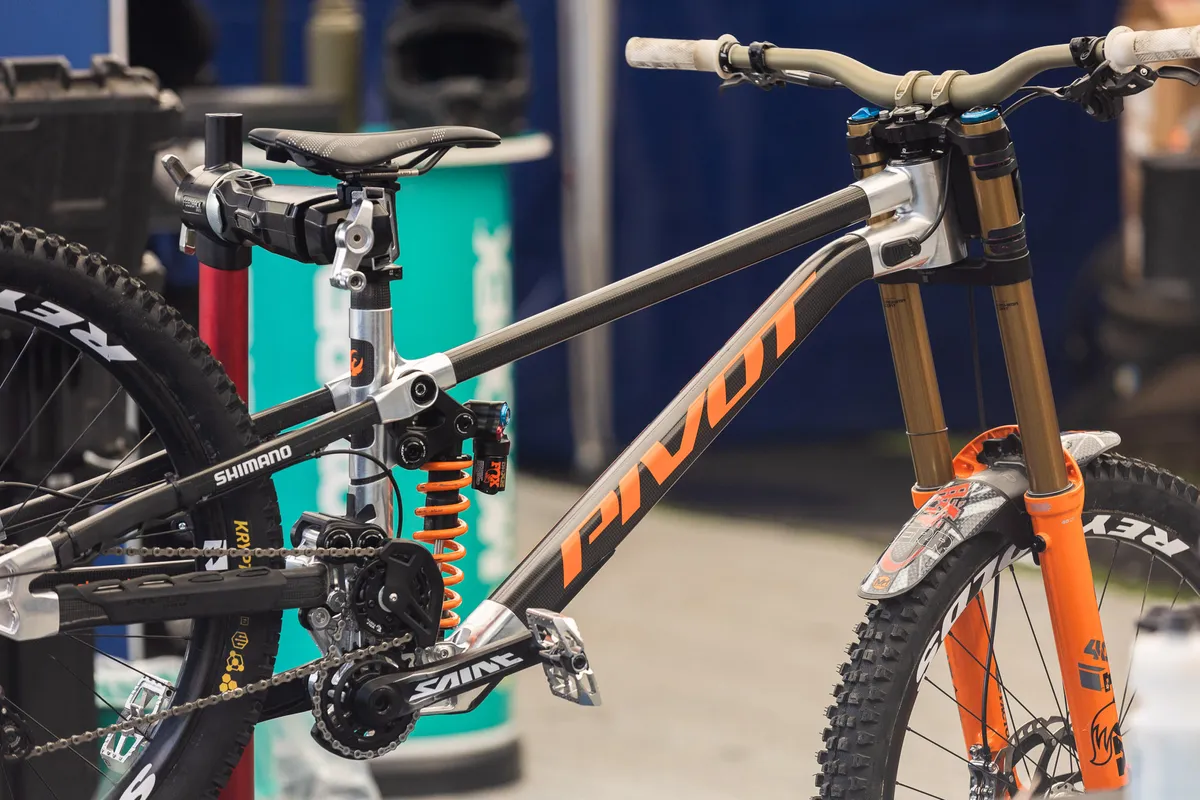The opening round of the UCI Downhill World Cup in Lenzerheide was the first chance of this season to see what new tech brands and teams have been cooking up over the off-season.
And wow, what a feast it was for tech-hungry racing fans – Specialized, Trek, Pivot, Deviate, Santa Cruz and Mondraker (phew!) all had prototype bikes between the tapes.
There were also new tyres from Schwalbe, as well as an updated RockShox Boxxer fork. A prototype version of Canyon’s K.I.S steering stabiliser was also seen and new SRAM Code brakes look to be in the works.
Read on for full details on all of this and more.
We’ve also got a full gallery of the best XC tech from Lenzerheide coming. Keep your eyes trained on the homepage or subscribe to the BikeRadar newsletter to get the latest tech news straight to your inbox.
Troy Brosnan’s prototype external Canyon K.I.S Sender

Troy Brosnan ran an external version of Canyon’s K.I.S (Keep It Stable) system on his Sender downhill race bike at Lenzerheide.
The K.I.S system was designed in collaboration with fellow German component manufacturer, Syntace and made its debut on the Canyon Spectral, which was released last year. The adjustable system is concealed within the top tube on the production bike.
The K.I.S system attaches the steerer of the fork to a set of coil springs via a super-strong synthetic fibre band. This provides a self-centring effect on the bars that helps to improve stability, both in a straight line and in corners.
We can certainly see the appeal of a little extra composure at high speed on a track as fast as Lenzerheide.
As far as we could tell, Troy seems to be the only Canyon CLLCTV rider running the system, on his otherwise standard Sender CFR.
LoÏc Bruni’s top-secret Specialized Demo

Despite a full season's worth of teasing, we’re still no closer to seeing exactly what hides under the bonnet of Loïc Bruni’s prototype Specialized Demo.
However, while teammate Finn Iles was still using a neoprene sleeve, Bruni’s Demo was equipped with a 3D-printed cover, which revealed a little more of the prototype Demo’s frame.
The huge alloy chainstays are the key talking point. These look as though they’ve been machined from a single block of alloy.

Elsewhere, this prototype frame uses carbon tubes bonded to what appear to be alloy lugs. A similar design is used on Atherton Bikes’ production bikes.
We imagine this approach is employed to enable Specialized to test different frame geometries or designs in a relatively short space of time without having to invest in a full carbon mould.

Also worth noting is the three-button electronic controller mounted under Bruni’s left-hand grip. We’ve previously seen the Frenchman using an electronic rear-shock lockout, but the third button suggests he now has access to an additional compression setting.

Interestingly, Specialized Gravity’s latest signing, Jordan Williams, raced on the current-generation Specialized Demo.
He smashed his elite World Cup debut, taking the win and finishing just under half a second ahead of his teammate Bruni, who claimed second place.
New RockShox Boxxer and SRAM Code brakes

RockShox and parent company SRAM have also been busy over the off-season.
RockShox-supported riders, like those of Trek Factory Racing Gravity, are running a new Boxxer triple-clamp fork.
While the current Boxxer uses 35mm stanchions, this prototype model looks to have substantially chunkier uppers.
A closer look suggests it's also fitted with the brand’s latest Charger 3 damper, as well as RockShox’s ButterCups technology.
We also spotted a SRAM Code caliper with a distinct red splattered finish on the back of a Trek Factory Racing Session downhill bike.
Prototype SRAM products are often given a different finish. This red caliper was first spotted last season.
Unusually, this was paired with what we think is a production-version Code caliper up front.
Could front and rear-specific downhill brakes from SRAM be in the works?
Prototype Trek Session

Trek Factory Racing riders have been testing what looks to be a prototype Trek Session with a redesigned rear triangle.
The production version of the bike sandwiches the idler pulley between the front end of the chainstay.

We reckon the external pivot is adjustable, with riders able to move it forward or backwards to tune the bike’s anti-squat and kickback characteristics.
The front triangle looks to be shared with the current model.
New Intense prototype

Intense Factory Racing has come prepared with a new prototype for the 2023 season.
Compared to last year’s test mule, the new Intense prototype has a more conventional frame design, with the shock mounted through a split seat tube.
Last year’s bike featured a massive rocker link and six-bar design. This has been dropped in favour of a more standard four-bar system.
In fact, the new layout is very similar to the current Specialized Enduro, though this bike features a high pivot with an idler pulley.
Schwalbe Tacky Chan

Schwalbe’s prototype ‘First Ride’ hot patch could be seen all over the pits on many of the brand’s top sponsored riders’ bikes.
While many were running First Ride versions of the well-known Magic Mary, we also spotted a new Schwalbe tyre with a blacked-out logo and an unfamiliar tread pattern.

Fitted to the rear wheel of Thibaut Dapréla’s Commencal Supreme DH, we reckon this looks a bit like a mash-up between the Magic Mary and Maxxis DHR2.
With widely spaced lugs and ramped centre tread, we think this could be a new mixed-condition rear tyre.
The worn Sharpie job cloaking the name suggests the new tyre could be called the Tacky Chan.
The new Pivot Phoenix prototype has two chains

The award for the most talked about bike in the pits goes to the Pivot Phoenix prototype.
Like Specialized, the bike uses aluminium lugs paired with carbon tubes to reduce the time required to make a prototype.
It uses a high-pivot DWF6 suspension design. This is based on Dave Weagle’s DW6 linkage – a design used on, among others, Atherton Bikes’ Downhill.200 bike.

A rocker link connects the seatstays to the frame and actuates the shock, with two short links connecting the elevated chainstays to the seat tube.
Unlike most high-pivot bikes with an idler, this prototype Pivot uses two separate chains, with one chain running from the primary chainring to a separate chainring/cog mounted above it. The second chain then runs from this to the cassette.

This setup results in improved chain wrap around the cogs. It can also be used to alter the gear ratio by changing the size of the upper cog/chainring, potentially enabling riders to use a smaller chainring on the crankset, improving ground clearance.
Santa Cruz V10.8 prototype

Now in its eighth iteration, the legendary Santa Cruz V10 looks closer to the finished product than most prototypes we spotted in the Lenzerheide pits.

We’ve been told the suspension curve of the new bike is more linear. This should make it easier to tune and provide a more predictable ride feel.

Despite still being under development, the Santa Cruz Syndicate riders were treated to a custom ‘racing red’ paintjob. Each paintjob also included a shout-out to the rider’s mechanics – a nice touch.
The Santa Cruz V10.8 has already proven itself, with Laurie Greenland and Jackson Goldstone piloting it to fourth and sixth place, respectively.
New Mondraker prototype

Mondraker is racing on a new test mule for the 2023 season.
This aluminium prototype is all about adjustability.
While we couldn’t see under the fabric frame cover, we were told the new bike has three adjustable bottom bracket positions, enabling riders to dial in their perfect bottom bracket height.

A removable seatstay brace also enables riders to modify rear-triangle stiffness to suit.
Rear-end stiffness can impact, among other things, grip, so it’s an area riders pay a lot of attention to.

A drop-in reach-adjust headset enables riders to fine-tune their position on the bike.
It’s less clear what is going on suspension-wise. We don’t think it’s a high-pivot design, but it’s very hard to tell at this stage.


